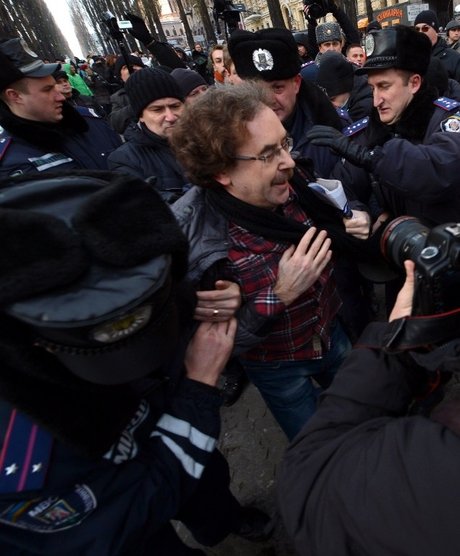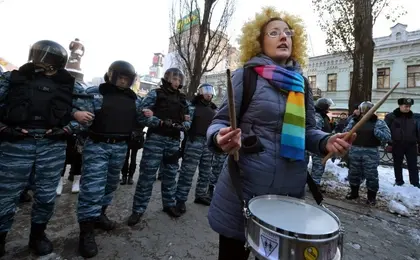Many in the
march of some 100 people, including human rights activists and LGBT
sympathizers, were protesting a law that bans the “promotion” of homosexuality.
One participant
sustained a broken nose, while others were sprayed with teargas. Police
detained six people.
JOIN US ON TELEGRAM
Follow our coverage of the war on the @Kyivpost_official.
Ihor Mykhalko,
Kyiv police spokesperson, said all six people detained on Dec. 8 are accused of
using teargas for hooliganism purposes. “This is a petty crime. There has been
no court ruling yet as far as I know,” Mykhalko told the Kyiv Post. He refused to identify the persons detained
are members of any organizations or political parties.
The LGBT community
blamed the nationalist Svoboda Party. However, the party – led by Oleh
Tyahnybok – denied involvement in the attacks. Svoboda won 38 seats in the
450-seat parliament in the Oct. 28 parliamentary election.
“Three girls
from the Svoboda Party approached me and my colleague who were holding banners
and attempted to tear up the banner. Although the police kept us in the circle,
they let these girls in because they had journalist IDs,” said Timur Lysenko, one
of the activists of Insight, an LGBT non-profit group.

Rights Day in the center of Kiev on December 8, 2012. (AFP)
Witnesses said
that a young man carrying a rainbow flag – a symbol of gay pride in the LGBT
community – was also attacked.
“One of the women
used teargas and then immediately a young man rushed to the place where the sound
equipment was stored and started to smash it. In a moment, police got involved,
a fight broke out and people got detained,” said Kostyantyn Reutski, a human
rights activist who took part in the protest.
Lysenko and his colleague,
along with the women who allegedly attacked them, were detained by the police,
along with three other people.
Sergiy, a man who said
he was assaulted spoke to the Kyiv Post on condition of anonymity because he
still fears for his personal safety. “I and three friends went to a cafe after
the protest and right near the exit we were attacked by a group of men,” Sergiy said.
The attack was swift
and the group of attackers dispersed quickly, he said. Sergiy is now recovering
at home with a broken nose and reported his case to the police.
Sergiy said he’s
“a left movement activist” and came to support the LGBT community. “I have never
been attacked before, but it has happened to people I know at these kind of
events,” he said.
Svoboda denied involvement
in the march, however.
“On Saturday
Svoboda Party had a general meeting which lasted from 10 a.m. until 5 p.m. There
was no other official event that day,” said Yuriy Syrotyuk, a spokesperson for
Svoboda. He added Svoboda’s journalists were not seen in the pictures of people
seen attacking anyone and were “probably just covering the event.” He said the
party is looking into the incident.
Syrotyuk added
that Svoboda supports “traditional Ukrainian family values.”
Lysenko says
nationalists always show up at their protests, and they recognize many
provocateurs by their faces. “Previously they were mostly young men. Now more
and more women are being used so that they will be less suspicious to the
police,” said Lysenko.
Being openly gay
in Ukraine is dangerous. Members of the LGBT community are often attacked. On
May 20, Svyatoslav Sheremet, leader
of the Gay Forum of Ukraine, was
attacked when the activists tried to organize Ukraine’s first gay pride parade
in Kyiv.
Pictures of a group of men assumed to be neo-Nazis beating Sheremet circulated
widely in major world media outlets. The incident drew attention to the problem
of homophobia in Ukraine.

(Reuters)
Ukraine’s legislature
might make it even more difficult to be gay in Ukraine. A draft law deemed
“homophobic” by the LGBT community and human rights organisations passed the first reading in parliament on Oct. 2, as 289 lawmakers voted in favor.
The draft law makes it illegal to talk about
homosexuality in public and in the media. Also illegal is the import,
distribution and broadcast of video, photo and audio products that “encourages
homosexuality.” Anyone who does risks being jailed for up to five years and
fined for up to Hr 5,000 should the law pass a second reading and is signed by
the president.
The law was bashed by the Amnesty International, the European
Union, the United Nations and human rights activists in Ukraine.
While attacks on
LGBT activists are not rare, police hardly ever detain attackers and even less
frequently charge anyone with more severe hate crime laws. Sheremet’s May attackers were never found.
Kyiv Post staff writer Svitlana Tuchynska can be reached at [email protected]
You can also highlight the text and press Ctrl + Enter




